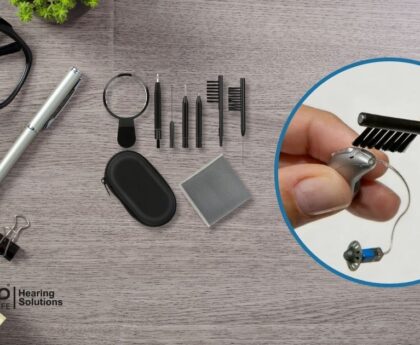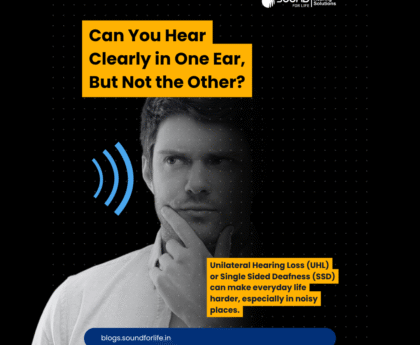Causes, Signs, and Treatment Options in India
Hearing loss is often dismissed as an age-related issue that it mostly affects men, but that’s not the whole story. Did you know that many women in India are experiencing hearing loss, and it often begins while they are still young? Research reveals that hormonal imbalances, inflammatory illnesses, and even certain medications can make women more prone to hearing-related problems.
This in-depth guide will cover all you need to know about hearing loss in women, including what causes it, how to spot it early, and the best treatment options available in India.
Why women’s hearing health is important
Hearing well plays a crucial role in how we interact with the environment. From communicating with loved ones to excelling at work and maintaining mental health. Good hearing not only helps a woman live a better life, it also supports a woman’s overall health.
Sadly, a lot of women simply ignore mild hearing problems and call them “temporary” or “just stress.” But untreated hearing loss can:
- Affect relationships and self-esteem
- Make people feel lonely and retreat from social situations
- Make you feel fatigue and headaches
- Increase the risk of depression or anxiety
- Be linked to cognitive decline over time
That’s why early diagnosis is important to find out what’s wrong and get treatment as soon as possible. Early treatment is essential since many causes of hearing loss in women are preventable or treatable.
Things That Often Make Women Lose Their Hearing
Let’s talk about the main reasons why Indian women could have trouble hearing.
1. Hormonal Changes
It’s amazing how much hormones affect the health of your ears.
- Pregnancy: Changes in hormones and more blood flow during pregnancy might make you temporarily deaf or give you tinnitus (ringing in the ears).
- Menopause: Lower amounts of oestrogen can impact how sensitive your hearing is by changing how blood flows to the inner ear.
- Menstrual periods: Some women discover that their hearing changes for a short time throughout their cycles because of hormonal changes.
Tip: Regular checkups and a balanced diet and exercise might help lessen these effects.
2. Autoimmune Disorders
Women are more likely than males to get autoimmune illnesses, which happen when the body’s immune system assaults its own tissues by mistake.
Some autoimmune diseases can hurt the parts of the ear that help you hear:
- Autoimmune Inner Ear Disease (AIED)
- Lupus
- Arthritis rheumatoide
- Hashimoto’s thyroiditis
In some circumstances, hearing loss might happen suddenly, change over time, or get worse. Early diagnosis is very important since treatment that is given quickly (such corticosteroids or immunotherapy) may often save hearing.
3. Ototoxic Medications
Some chemicals, called ototoxic substances, can damage the inner ear.
- Some antibiotics, such as gentamicin
- Drugs for chemotherapy
- Taking a lot of aspirin or NSAIDs
- Diuretics for high blood pressure
Women who are getting treatment for cancer, infections, or chronic conditions should always talk to their doctor about how the therapy could affect their hearing. In some circumstances, alternative medicines can be used.
4. Loud noise exposure
Loud noises at home and at work might hurt your hearing over time.
Common sources include
- Hair dryers and blenders that are used a lot at high volume.
- Loud music with headphones or during the gym
- Noise at work (for example, manufacturing workers, teachers, and healthcare personnel who work in loud places)
- Urban Noise pollution
Women who wear earphones for lengthy periods of time are more likely to slowly lose their hearing.
Tip: Wear headphones that block out noise and observe the “60-60 rule,” which says to listen at 60% level for no more than 60 minutes at a time.
5. Ear infections and other health issues
If you don’t treat them, chronic ear infections, sinus problems, or allergies can cause hearing loss that lasts for a long time or perhaps forever.
- Otitis medium (an infection of the middle ear) is one of these conditions.
- Too much earwax
- Meniere’s illness
- Sudden sensorineural hearing loss can happen to women of any age. Regular ENT examinations help find them early on.
6. Hearing Loss Due to Age (Presbycusis)
As women become older, the natural wear and tear on the inner ear causes their hearing to go worse over time.
This usually starts between the ages of 50 and 60 and gets worse with time.
Some signs are having trouble comprehending speech in loud areas or the TV getting louder and louder all the time.
Hearing loss that comes with ageing can’t be fixed, but modern hearing aids can help you hear better and feel more confident.
7. Your genes and family history
- If others in your family have lost their hearing, you may be more likely to lose yours too.
- Some changes in DNA can make women more likely to get sound damage or problems with their inner ear.
- If more than one family member has hearing problems, a genetic consultation may be useful.
Early Signs of Hearing Loss in Women
Hearing loss usually happens slowly, so you might not notice it right away.
Here are some frequent warning indicators to watch out for:
A lot of the time, you have to ask other people to repeat themselves.
- People who “mumble” or don’t talk clearly
- Turning the volume up on your TV or phone more than most people like
- Hard to follow discussions in loud areas
- Having trouble hearing high-pitched sounds, like kids or birds
- Feeling tired after talking to people (listening fatigue)
- Hearing ringing or buzzing in the ears
If any of these sound familiar with you, you should get your hearing checked without any delay.
Diagnosing Hearing Loss in Women
The good news is that it is simple and easy to find out whether you have hearing issues.
Audiologists at professional clinics like SFL Hearing Solutions utilise cutting-edge diagnostic techniques to precisely check your hearing loss levels and what kind and how bad their hearing loss is.
Tests that are often done are:
- Pure-Tone Audiometry: Tests how well you hear different pitches and loudness.
- Speech Audiometry: Tests how well you can interpret spoken words.
- Tympanometry looks for problems in the middle ear, such as fluid accumulation or a rigid eardrum.
- Otoacoustic Emissions (OAE): A test for how well the cochlea works in the inner ear.
These tests assist in designing a treatment plan that is right for you based on your hearing profile.
Options for treating women in India who have hearing loss
Depending on the reason and how bad it is, therapy may involve medical care, surgery, or hearing aids.
1. Treatment by a doctor
If you have hearing loss because of an infection, inflammation, or an inflammatory disease, your doctor may give you:
- For infections, you can take antibiotics or antifungals.
- For acute hearing loss or autoimmune reasons, steroids or anti-inflammatory medicines can help.
- Hormonal treatment for problems connected to menopause or pregnancy
For comprehensive care, always see both an ENT doctor and an audiologist.
2. Hearing Aids
Hearing aids today are compact, attractive, and are highly effective. They naturally make sounds louder, which makes it easier for you to hear without straining.
At SFL Hearing Solutions, you will find a wide range of digital hearing aids from well-known companies like Phonak, Signia, and Widex. Each one is made to fit a distinct lifestyle and hearing requirement.
Some common types of hearing aids are:
- Behind the Ear (BTE): This is a comfortable and powerful device that works well for people with moderate to severe hearing loss.
- Receiver-in-Canal (RIC): Sleek, practically undetectable, and has great sound quality.
- In-the-Ear (ITE): fits perfectly and is hard to see.
- CIC, or Completely-in-Canal, is almost unnoticeable and works well for people with mild to moderate hearing loss.
Key features to look for:
- Bluetooth connectivity for calls and TV
- Rechargeable batteries
- Noise cancellation
- Directional microphones
- Smartphone app controls
3. Cochlear Implants
Cochlear implants may be suggested for women who have severe or profound hearing loss who don’t get much help from hearing aids.
These are electronic devices that are surgically implanted into the ear and directly stimulate the auditory nerve, bringing back the sense of hearing.
4. Lifestyle and Preventive Tips
Eat a balanced diet that is high in vitamins A, C, E, and magnesium to preserve your hearing and keep it healthy.
- Don’t spend too much time around loud noises.
- Get your hearing checked once a year after you turn 40.
- Take care of health problems including diabetes, high blood pressure, and thyroid problems.
- Wear ear protection when you need to.
How Hearing Loss Affects Women Emotionally and Socially
Hearing loss doesn’t simply hurt your ears; it also hurts your mental health and self-esteem.
A lot of women say they feel:
- Embarrassed to ask others to repeat themselves
- Isolated in social gatherings
- Less confident at work
- Stressed or anxious about communication
Support groups, therapy, and family education can be very helpful.
Hearing aids now are smart and undetectable, which makes it simpler than ever to be active and feel good about yourself.
Why Choose SFL Hearing Solutions?
We at SFL Hearing Solutions understand that every woman’s hearing journey is different.
Our goal is to make hearing care accessible, comfortable, and empowering.
We have:
- Free consultations and hearing tests
- The latest technology for digital hearing aids
- Custom fitting and adjustment to meet the unique hearing needs of women
- Free Home Visits and personalised aftercare
- Affordable Prices and EMI options
No matter how bad your hearing loss is, whether it is mild, moderate or severe, we will help you find the best possible solution to reconnect with the sounds you love.
Take the Next Step towards Better Hearing
If you notice any changes in your normal hearing, even mild hearing difficulties, do not ignore them.
Hearing loss is easier to treat when detected early.
Call SFL Hearing Solutions today to set up your hearing test and get professional guidance from our trained audiologists.
Rediscover the joy of hearing clear conversations again, sweet laughters, and the beautiful sounds that make life beautiful.
Disclaimer:
This article is for educational purposes only and should not replace professional medical advice.
Always consult a qualified ENT specialist or audiologist for diagnosis and treatment of any hearing-related issue.
SFL Hearing Solutions – Helping India Hear Better, One Ear at a Time.





